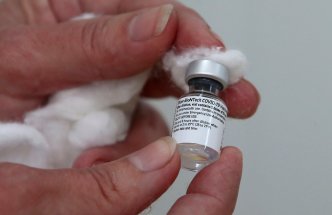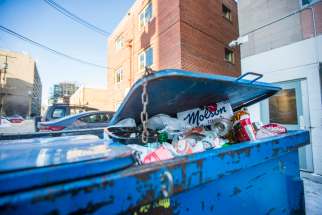Most-senior Manitobans at top of vaccination list Residents age 95 and older will be eligible to book appointments next week to get their first shot, province announces
Read this article for free:
or
Already have an account? Log in here »
To continue reading, please subscribe:
Monthly Digital Subscription
$0 for the first 4 weeks*
- Enjoy unlimited reading on winnipegfreepress.com
- Read the E-Edition, our digital replica newspaper
- Access News Break, our award-winning app
- Play interactive puzzles
*No charge for 4 weeks then price increases to the regular rate of $19.00 plus GST every four weeks. Offer available to new and qualified returning subscribers only. Cancel any time.
Monthly Digital Subscription
$4.75/week*
- Enjoy unlimited reading on winnipegfreepress.com
- Read the E-Edition, our digital replica newspaper
- Access News Break, our award-winning app
- Play interactive puzzles
*Billed as $19 plus GST every four weeks. Cancel any time.
To continue reading, please subscribe:
Add Free Press access to your Brandon Sun subscription for only an additional
$1 for the first 4 weeks*
*Your next subscription payment will increase by $1.00 and you will be charged $16.99 plus GST for four weeks. After four weeks, your payment will increase to $23.99 plus GST every four weeks.
Read unlimited articles for free today:
or
Already have an account? Log in here »
Hey there, time traveller!
This article was published 17/02/2021 (1759 days ago), so information in it may no longer be current.
Manitoba’s most-senior citizens can get in line for a COVID-19 injection next week as the province begins to expand its criteria for immunization with more doses expected to arrive in the province.
Dr. Joss Reimer, medical lead for the COVID-19 vaccine implementation task force, said all Manitobans who are 95 years of age or older will be able to book an appointment for a shot at their nearest vaccination clinic by phone next week.
“We don’t normally give a week’s heads-up before opening up eligibility because we do worry that it’s going to create some confusion about when people become eligible,” Reimer said. “But for Manitobans over 95, many of them are going to require additional considerations, additional assistance, and likely are not checking the website to find out when they’re eligible.
“So we just wanted to give that extra week to be able to work on all of those logistics.”
Offering immunizations to the most-senior Manitobans represents the first step toward vaccinating members of the public. The province estimates about 5,000 residents are in that age category.
“I know this is something that many Manitobans are looking forward to for themselves and their loved ones,” Reimer said.
Currently, the province is providing vaccines to select health-care workers and other people it has prioritized based on their place of employment or their work with COVID-19 specimens and cases. Leadership with the First Nations Pandemic Response Co-ordination Team has developed separate eligibility criteria for Indigenous people and communities.
Reimer said the province expects to receive a total of 74,880 doses of the Pfizer-BioNTech vaccine by the end of March.
“We don’t normally give a week’s heads-up before opening up eligibility because we do worry that it’s going to create some confusion about when people become eligible. But for Manitobans over 95, many of them are going to require additional considerations, additional assistance, and likely are not checking the website to find out when they’re eligible.”
– Dr. Joss Reimer
Vaccine-eligibility criteria has been expanded to include community services workers in “congregate group care” settings such as homeless shelters, family violence shelters, emergency placement shelters and second-stage housing.
Corrections officers and employees of congregate-living facilities (born on or before Dec. 31, 1955), are also eligible. Staff who provide direct care to people in Community Living disABILITY Services or the child and family services sector also qualify (Manitoba Families will contact workers directly).
With the expanded criteria, the province has also made the phone number to book COVID-19 vaccine appointments public.
Don’t call… yet
As more Manitobans become eligible for the COVID-19 vaccine, the province has made the phone number to book appointments public.
Eligible residents can call 1-844-626-8222 (1-844-MAN-VACC). However, provincial officials are asking the public to carefully review eligibility criteria before calling.
Manitoba has not yet opened up vaccinations to the general public.
As more Manitobans become eligible for the COVID-19 vaccine, the province has made the phone number to book appointments public.
Eligible residents can call 1-844-626-8222 (1-844-MAN-VACC). However, provincial officials are asking the public to carefully review eligibility criteria before calling.
Manitoba has not yet opened up vaccinations to the general public.
Only select health-care workers, and individuals the province has prioritized for vaccines based on their place of employment or work with COVID-19 specimens and cases can currently book appointments.
However, beginning next week, Manitobans 95 years of age and older will become eligible, Dr. Joss Reimer, medical lead for the vaccine implementation task force said. The vaccinations will take place at the “super-site” clinics in the future.
She is asking eligible seniors and their families to wait until next week when she formally announces their eligibility to call the vaccine line.
“We wanted to give some time for their families, for some of our community groups, for some of the facilities where these folks live to start working with them, to start working with us, on how best to get these folks to the clinics, how best to book their appointment, once they are eligible,” she said.
A complete list of eligible Manitobans is available at manitoba.ca.
Reimer asked Manitobans to be patient and call the booking line only if they meet the eligibility criteria listed on the provincial government’s website. An online booking system is also in the works and is expected to go live by April.
Reimer said she will announce when the province is ready to take appointments for people 95 and older.
“The last time that our phone number was unintentionally made public, we received hundreds of thousands of phone calls,” she said. “So I am asking Manitobans, please do not call until you’re eligible.”
On Friday, immunization teams will be heading into select supportive housing, hospitals and assisted-living facilities — which have been prioritized as part of the province’s vaccine rollout — in Winnipeg and Brandon.
Reimer explained the province has developed a prioritized list of all congregate-living facilities in the province (roughly 1,400 such places with nearly 23,000 people) based on age of the residents, health status, ability to follow public-health guidance and income.
First up in Winnipeg, injections will be administered at Lions Supportive Housing (Friday), Residence Despins Supportive Housing (Monday), Victoria General Hospital (Tuesday), Arlington Haus (Wednesday), Grace General Hospital and Assiniboine Links (Feb. 25) and Dakota House Homestead, Devonshire House I Homestead and Devonshire House II Homestead (Feb. 26).
“The last time that our phone number was unintentionally made public, we received hundreds of thousands of phone calls,. So I am asking Manitobans, please do not call until you’re eligible.”
– Dr. Joss Reimer
A total of 21 supportive housing and seniors homes in Brandon have also been prioritized.
An alphabetical list of all congregate-living facilities selected for visits by immunization teams has been made public but does not indicate which facilities are considered high, moderate or low priority.
On Monday, the National Advisory Committee on Immunization updated its guidance for vaccine prioritization to include “adults in racialized and marginalized” communities and front-line essential workers who cannot work virtually to be vaccinated in the second stage of the rollout. Adults under 60 years old with an underlying health condition that puts them at high risk of COVID-19 should be prioritized in Stage 3, NACI said.
Inmates have to wait
Provincial jails have been designated as “medium priority” facilities for COVID-19 immunization, public-health officials clarified Wednesday, after a draft planning document listed Brandon Correctional Centre as being at the top of the list.
Provincial jails have been designated as “medium priority” facilities for COVID-19 immunization, public-health officials clarified Wednesday, after a draft planning document listed Brandon Correctional Centre as being at the top of the list.
Dr. Joss Reimer, medical lead for the vaccine implementation task force, said inmates at jails will be prioritized as part of the province’s effort to immunize residents of congregate-living facilities but will come after people living in higher-priority sites, such as supportive housing and assisted living.
“The people putting together the schedule did what we would expect in most circumstances,” Reimer said. “Public-health staff were going to that facility on that day and so they felt it would make sense to do the immunizations at the same time.
“But the COVID vaccine is not a typical public-health service. And so we have to allocate vaccine based on what the science is telling us and based on our assessment of risk.”
At present, the province has not prioritized people with underlying health conditions, essential workers or adults from racialized communities disproportionately affected by the disease for advance access to vaccines.
“We have tables in Manitoba that are looking at both of these groups, and we will be taking NACI into consideration at those tables. At this time, no decisions have been made,” Reimer said.
“We also know that racialized groups face many systemic barriers. We are committed to consulting and working with community groups and other key stakeholders to address those barriers to accessing the vaccine.”
Reimer said the vaccine task force is meeting with a medical advisory table to identify the highest risk conditions for people who need hospitalization or are admitted to intensive care.
“If we do go that way, we want to make sure that we are still following the science, and that we are expanding to who we know is highest risk,” she said. “And some of those may be surprising, some of them not so much.”
A list of such conditions is being compiled, she said. Provincial data on the impacts and risk of COVID-19 on racialized communities has yet to be released.
danielle.dasilva@freepress.mb.ca

Our newsroom depends on a growing audience of readers to power our journalism. If you are not a paid reader, please consider becoming a subscriber.
Our newsroom depends on its audience of readers to power our journalism. Thank you for your support.






